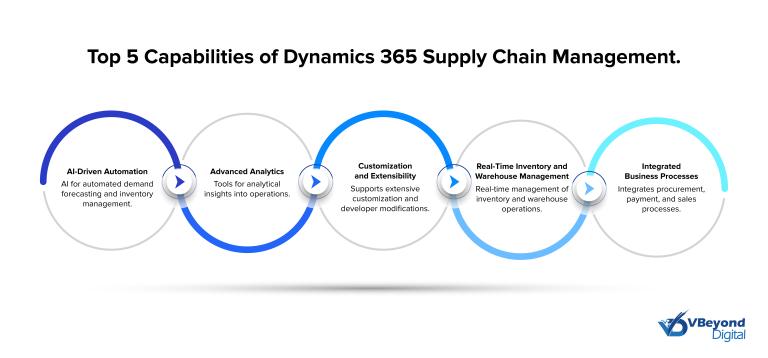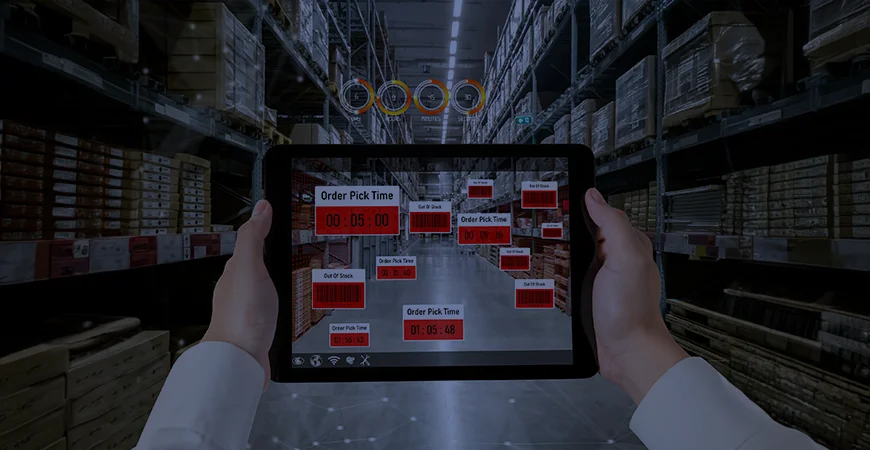Section
Dynamics 365 Supply Chain Management for Competitive Advantage in Retail Ops
Section
Section
In today’s highly competitive retail environment, effective supply chain management is critical. This blog post examines how Dynamics 365 can revolutionize your retail business by integrating cutting-edge retail supply chain automation. We’ll cover the key benefits of implementing Dynamics 365, such as improved inventory management, quicker response times, and enhanced customer satisfaction. Additionally, we discuss real-world applications and success stories to illustrate how automating your supply chain can lead to significant competitive advantages. Join us to discover how you can transform your retail operations with the power of Dynamics 365.
Section
The retail sector is undergoing a significant transformation, driven by shifts in consumer behavior, technological advancements, and heightened competition. Retailers face the challenge of adapting quickly to market demands while managing complex supply chain logistics. This dynamic environment calls for innovative solutions to maintain operational efficiency and meet customer expectations.
Section
Capabilities of Dynamics 365 Supply Chain Management (D365 SCM) and its Relevance for Being Competitive
Dynamics 365 Supply Chain Management (SCM) stands out as a crucial tool for retailers seeking to gain a competitive edge. By integrating advanced analytics and real-time data capabilities, Dynamics 365 SCM allows retailers to manage their operations more effectively—from inventory and warehouse management to customer engagement. This comprehensive approach not only streamlines operations but also provides actionable insights that drive strategic decision-making and tactical adjustments in real-time.

Section
Unpacking the Value of Dynamics 365 Supply Chain Management in Retail
Dynamics 365 Supply Chain Management equips retailers with a suite of advanced tools designed to refine and elevate every aspect of retail operations, from inventory management to customer engagement. Here’s how these features contribute to achieving competitive advantages in the retail sector:
- Enhanced Operational Efficiency: Integrates smoothly with existing retail systems, creating a unified platform that simplifies management across various channels.
Example: Real-time inventory tracking syncs with sales data to adjust stock levels automatically, preventing overstock and stockouts.
- Data-Driven Decision Making: Leveraging advanced analytics allows retailers to understand consumer patterns and anticipate market trends.
Impact: Strategic decisions are informed by accurate, up-to-date information, leading to more effective promotions and stock adjustments.
- Improved Supplier Collaboration: Streamlined communication and data sharing with suppliers ensure that inventory needs are met efficiently and cost-effectively.
Benefit: Reduction in lead times and enhanced quality of goods received, contributing to overall supply chain reliability.
- Customization and Flexibility: Adaptable to the unique needs of retail operations, allowing for customization in processes like order fulfillment and returns management.
Advantage: Tailored solutions that fit specific operational demands and consumer expectations, enhancing the overall effectiveness.
Section
Section
Boost Your Retail Ops with Dynamics 365! Learn with us.
Section
Case Studies: Dynamics 365 Supply Chain Management in Action
Exploring real-life applications of Dynamics 365 SCM highlights its transformative impact on retail operations. Here, we examine how companies have leveraged this technology to streamline their supply chain processes and achieve strategic advantages:
Example 1: GWA Group Limited
- Problem: During the pandemic, GWA Group Limited, a prominent Australian innovator in bathrooms and kitchens, faced significant operational challenges. Shifts in customer demand, market lockdowns, and disrupted supply chains threatened the company’s business continuity and growth. The dilemma was whether to continue its digital transformation or redirect resources.
- Solution: Choosing to accelerate its digital transformation, GWA Group collaborated with Microsoft Consulting Services to deploy Dynamics 365. This strategic move aimed to simplify business processes, achieving a digital overhaul of their end-to-end operations. The deployment focused on integrating various business functions—Customer Care, Warehouse Management, Finance & Operations, Supply Chain, Commerce, and Marketing into a single, unified system.
- Benefit: The implementation of Dynamics 365 transformed GWA Group’s operations, enhancing transparency and flexibility across all business areas. This shift not only met the changing industry demands but also ingrained a culture of innovation within the company. According to Alex Larson, General Manager of Technology & Transformation, this transformation reduced complexity and significantly boosted operational agility, preparing the company for future challenges and growth opportunities.
Example 2: Michael Hill
- Problem: Michael Hill, a global high-end jeweler, faced inefficiencies in inventory management and customer service, which impeded their ability to offer exceptional in-store experiences. The legacy systems were inadequate for managing global store operations and did not support seamless multi-channel processes.
- Solution: In response, Michael Hill engaged DXC Technology and Microsoft to overhaul their retail operations by implementing Microsoft Dynamics 365 Commerce. This initiative was part of a broader transformation aimed at enhancing every facet of the retail process—from production to fulfillment. The solution provided a cohesive platform for store operations and enabled end-to-end visibility and integration across financial and supply chain management.
- Benefit: The rapid deployment of Dynamics 365 allowed Michael Hill to adapt quickly to the evolving business and market conditions during the pandemic. It improved inventory visibility and facilitated innovative fulfillment models, such as treating each store as a potential warehouse for online orders. These changes not only streamlined operations but also provided deep insights into customer preferences, significantly enhancing customer service and boosting sales.
Example 3: Tan Boon Ming Sdn Bhd (TBM)
- Problem: TBM, Malaysia’s leading appliances superstore, struggled with inefficient data synchronization and heavy manual processes due to an unintegrated Warehouse Management System. This challenge was compounded during the pandemic, as maintaining service levels became more difficult.
- Solution: TBM embarked on a digital transformation by implementing Dynamics 365 Supply Chain Management, which integrated with their existing systems to enhance visibility and control over inventory. This was supplemented by the implementation of Dynamics 365 Finance and Dynamics 365 Commerce, creating a seamless, integrated platform for all business operations.
- Benefit: The integration of Dynamics 365 modules transformed TBM’s business processes, enabling efficient, real-time reporting and inventory management across multiple locations. During the Movement Control Order period in Malaysia, TBM could continue operations without delays, providing consistent and scalable customer experiences. The digital transformation not only streamlined operations but also reinforced TBM’s vision of delivering quality in every aspect of its service.
Section
Leveraging Real-Time Data for Market Responsiveness
The agility to respond to market fluctuations promptly is crucial for retailers aiming to stay competitive. Dynamics 365 Supply Chain Management enhances this capability by providing powerful real-time data analytics tools that support quick and informed decision-making. Here’s how Dynamics 365 SCM solution transforms data into a strategic asset for retailers:
- Immediate Market Insights: Real-time data access enables retailers to swiftly adjust to consumer demand and market conditions.
Benefit: Decreased reaction times to trends and disruptions, ensuring that product availability aligns with consumer expectations.
- Advanced Analytics for Forecasting:
Sales Forecasting: Utilizes historical data and predictive analytics to forecast future sales, allowing for better inventory planning.
Demand Sensing: Short-term demand forecasting that adjusts to market changes almost in real-time, improving supply chain responsiveness.
- Strategic Decision Support:
Data Visualization Tools: Simplify complex data sets into understandable visuals, helping stakeholders make informed decisions quickly.
Scenario Planning: Test various market scenarios and their outcomes to prepare for potential future events.
Section
Innovations in Warehouse and Inventory Management
Dynamics 365 SCM introduces advanced warehouse management solutions that significantly enhance the efficiency and accuracy of inventory management, crucial for maintaining the pace with the dynamic demands of retail. Here’s how Dynamics 365 SCM drives innovation in warehouse operations:
- Optimized Inventory Levels:
Automated Replenishment: System-driven suggestions for replenishment based on real-time sales and inventory data.
Reduction in Waste: Minimized overstocking and understocking, reducing costs and improving space utilization.
- Enhanced Order Fulfillment Accuracy:
Barcoding and RFID: Facilitate faster and more accurate picking and packing processes.
Order Routing Algorithms: Determine the most efficient routes within the warehouse, speeding up the order fulfillment process.
- Automation of Warehouse Tasks:
Robotic Process Automation (RPA): Automates repetitive tasks, freeing up staff for more complex duties.
Self-managed Inventory Systems: Robots and automated systems manage inventory movement, reducing human error.
Case Example: Integration with existing warehouse technology to streamline operations and accelerate order processing times, directly impacting customer satisfaction through faster delivery.
Section
Enhancing Customer Experience through Supply Chain Excellence
In the competitive retail industry, a seamless supply chain is directly linked to customer satisfaction and loyalty. Dynamics 365 SCM provides tools that not only streamline operations but also significantly improve the customer experience:
- Real-Time Inventory Visibility:
Feature: Offers customers accurate, up-to-the-minute inventory information across all channels.
Impact: Reduces customer frustration due to out-of-stock situations and enables reliable promise dates for order fulfillment.
- Distributed Order Management:
Capability: Intelligently allocates how and where orders are fulfilled based on inventory location, delivery speed, and cost considerations.
Benefit: Optimizes delivery times and costs, enhancing customer satisfaction by meeting delivery expectations.
- Customer-Centric Returns Management:
Process: Facilitates easy and flexible returns, integrating them seamlessly into the supply chain.
Advantage: Builds customer trust and loyalty by simplifying the returns process and quickly addressing any issues.
- Higher Customer Engagement:
Tool: Utilizes predictive analytics to provide personalized shopping experiences and recommendations based on previous purchases and browsing behavior.
Result: Increases customer engagement and sales through tailored marketing and upselling opportunities.
Section
Strategic Asset Management for Long-Term Growth
Effective management of high-value assets is essential for the sustainability and scalability of retail operations. Dynamics 365 SCM offers robust asset management features that enhance the lifespan and performance of critical assets, supporting long-term operational growth:
- Lifecycle Management:
Function: Tracks and manages the lifecycle of each asset from acquisition through to disposal.
Impact: Maximizes asset usability and performance, while minimizing maintenance costs and downtime.
- Predictive Maintenance:
Technology: Utilizes IoT and AI to predict when maintenance is needed before breakdowns occur.
Benefit: Prevents unexpected failures, reduces costly repairs, and extends the operational life of assets.
- Resource Optimization:
Strategy: Allocates resources efficiently based on real-time data and predictive analytics.
Outcome: Ensures optimal use of assets and reduces wastage of resources, contributing to cost savings and environmental sustainability.
- Compliance and Risk Management:
Feature: Helps maintain compliance with industry standards and regulations while managing risks associated with asset management.
Advantage: Avoids legal and financial penalties and enhances the reputation of the business.
Section
Future-Proofing Retail with Dynamics 365 SCM
As retail landscapes evolve and new technologies emerge, adopting scalable and forward-thinking solutions is crucial for retailers aiming to stay ahead. Dynamics 365 SCM is designed to accommodate future growth and technological advancements, making it an ideal choice for future-proofing retail operations:
- Scalability of Cloud Solutions:
Capability: Easily scales to meet increasing demands without significant new investments in physical infrastructure.
Advantage: Supports business growth and expansion with flexible, cost-effective cloud deployment options.
- Ease of Adopting New Technologies:
Innovations: Incorporates IoT, AI, and machine learning to enhance supply chain operations from predictive analytics to automated decision-making.
Impact: Keeps retailers at the forefront of technology, ensuring they can adapt to changes and capitalize on new opportunities.
- Integration with Smart Devices and Platforms:
Functionality: Seamlessly integrates with smart devices and platforms for enhanced data collection and operations management.
Benefit: Provides deeper insights and greater control over the supply chain, enabling more responsive and informed decision-making.
- Sustainability and Efficiency:
Focus: Promotes sustainable practices through efficient resource management and reduced waste.
Outcome: Helps retailers achieve not only economic goals but also environmental responsibilities, enhancing brand value and customer loyalty.
Section
Conclusion
Microsoft Dynamics 365 Supply Chain Management stands out as a pivotal solution for retailers, providing the tools necessary for efficient operation, strategic growth, and enhanced customer satisfaction. By prioritizing digital transformation in their supply chain strategies, retail leaders can ensure their businesses are not only equipped to handle today’s challenges but are also positioned to capitalize on tomorrow’s opportunities. With its comprehensive features, from real-time data analytics to advanced warehouse management, Dynamics 365 SCM empowers retailers to transform their operations and achieve a lasting competitive edge.




